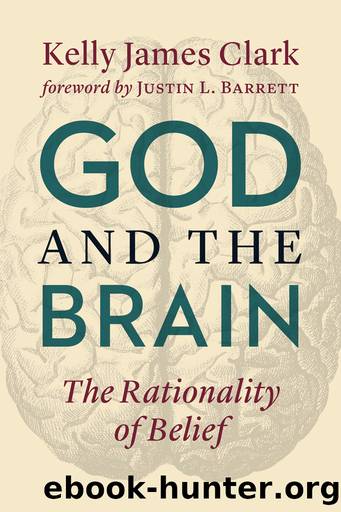God and the Brain by Kelly James Clark;

Author:Kelly James Clark;
Language: eng
Format: mobi, epub
Publisher: Wm. B. Eerdmans Publishing, Co.
Published: 0101-01-01T00:00:00+00:00
And let us take supernaturalism and naturalism as the competing hypotheses:
S = Supernaturalism: there is a being with sufficient powers who is interested in creatures who are capable of gaining the truth.
N = Naturalism: nothing exists but spacetime, and material objects and events in spacetime; there are no supernatural beings.
Since one would expect D much more given S than given N, one has much more reason to believe S than N. We have good reason, therefore, to prefer supernaturalism over naturalism.
If we are, by and large, capable of grasping the truth, which worldview would best explain this? Our cognitive faculties find their intellectual home in the worldview of supernaturalism, while the worldview of naturalism is intellectually inhospitable to reliable cognitive faculties.
The theist can and should recognize the characteristic ways in which we often get things wrong (indeed, most theists have historically emphasized human fallibility; we are, after all, creatures and not gods). But the theist, unlike the naturalist, has an independent reason to be confident that, despite these examples, we are still able to arrive at truth and should not be skeptical about the majority of our beliefs.
We arenât skeptical about the reliability of our cognitive faculties, nor are we skeptical about the truth of many, perhaps most, of our beliefs about the world. It does seem that, overall, we are capable of grasping truth. I know when I am holding a book in my hands, I recognize my daughter when she walks into the room, and I believe that Paraguay really exists when I see it on a map. Which worldview best explains the reliability of our cognitive faculties? Theism gives us reason to believe that humans have cognitive faculties that are reliable and do arrive at important truths. Naturalism, on the other hand, leads us to expect nothing about our cognitive faculties. Further, when we combine naturalism with evolution, we find good reasons to doubt the reliability of our cognitive faculties. Thus, the worldview of naturalism seems intellectually inhospitable to accepting the reliability of our cognitive faculties.
Complications
Suppose we assume that our cognitive faculties were formed by unguided evolution. Under that assumption, we need to look at the proportion of our beliefs that are true compared to those that are false. If most of our ordinary beliefs are true, it follows that unguided evolution in general leads to true beliefs. I have argued that theism but not naturalism provides us with independent reason to think we would have roughly true beliefs. But does not naturalism also have such an independent reasonânamely, that, in general, for those creatures capable of belief, false beliefs will hurt survival? Showing that in some instances this is not true does not undermine this more general claim. A complete defense of the evolutionary argument against naturalism would need to rebut this claim.
Further, evidence that we have propensities to form false beliefs in some areas cuts against theism: if God created our minds, then God created with belief-forming mechanisms that systematically produce false beliefs. Again, a more thorough defense of this argument must consider this objection.
Download
This site does not store any files on its server. We only index and link to content provided by other sites. Please contact the content providers to delete copyright contents if any and email us, we'll remove relevant links or contents immediately.
Zero to IPO: Over $1 Trillion of Actionable Advice from the World's Most Successful Entrepreneurs by Frederic Kerrest(4574)
Machine Learning at Scale with H2O by Gregory Keys | David Whiting(4313)
Never by Ken Follett(3957)
Harry Potter and the Goblet Of Fire by J.K. Rowling(3859)
Ogilvy on Advertising by David Ogilvy(3624)
Shadow of Night by Deborah Harkness(3369)
The Man Who Died Twice by Richard Osman(3080)
Book of Life by Deborah Harkness(2939)
The Tipping Point by Malcolm Gladwell(2925)
Will by Will Smith(2920)
Purple Hibiscus by Chimamanda Ngozi Adichie(2858)
0041152001443424520 .pdf by Unknown(2846)
My Brilliant Friend by Elena Ferrante(2832)
How Proust Can Change Your Life by Alain De Botton(2815)
How to Pay Zero Taxes, 2018 by Jeff A. Schnepper(2655)
Hooked: A Dark, Contemporary Romance (Never After Series) by Emily McIntire(2555)
Rationality by Steven Pinker(2366)
Can't Hurt Me: Master Your Mind and Defy the Odds - Clean Edition by David Goggins(2342)
Borders by unknow(2315)
